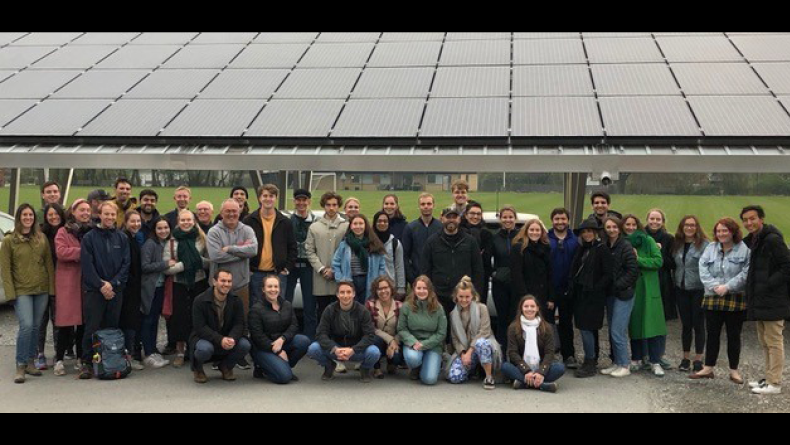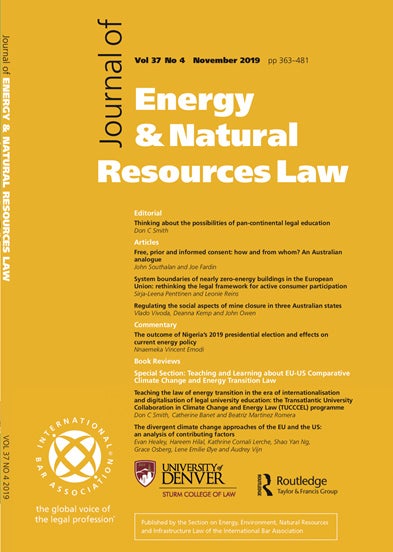Student Research Takes Top Honors in Inaugural EU/US Environmental Law and Policy Course
Course takes a hands-on, international approach to legal education.
Research by University of Denver Sturm College of Law students Grace Osberg and Evan Healey, as well as international counterparts from six different nations was recently selected for publication in the prestigious and highly selective Journal of Energy & Natural Resources Law, which is published by the International Bar Association.
The group’s paper “The divergent climate change approaches of the EU and US: an analysis of contributing factors,” earned top honors, and the publishing opportunity, through the ground-breaking, semester-long Transatlantic Comparative Climate Change and Energy Transition Law course offered at Denver Law.
This first-of-its-kind course, developed in part by Denver Law, launched in January 2019 and included 10 two-hour simultaneous video conferencing class sessions where students met in a virtual classroom. They also worked in cross-university groups to analyze and address issues in climate change and energy transition and created a paper that was presented in Copenhagen, Denmark.
Through FaceTime and messaging apps, the winning group, who included Healey, Osberg and international students Hareem Hilal, Kathrine Cornali Lerche, Shao Yan Ng, Lene Emilie Oye and Audrey Vijn, worked out both distance and language barriers to put together their winning article, beating out seven other cross-university student teams.
“It’s a massive honor to be published in this journal. Going into the program, we didn’t know that being published was a possibility. We just went in excited to learn about the policy, and excited to travel and learn about our international counterparts,” said Osberg. “We worked really hard on this paper, and Professor Smith [who edits the journal on behalf of the International Bar Association] told us that we were the youngest contributors to the journal during his tenure,” said Osberg.
And while publication is a major accomplishment for the students, the course also offered them a chance to view climate and energy from a different perspective, which will stay with them as they move forward in their careers.
“There were many benefits of having international counterparts, especially on a paper that compared U.S. climate policy with European climate policy,” Healey said about working on the winning paper. “Learning about governance from a distance is one thing but experiencing it firsthand is quite another.”
Hands-on, Real-World Training
The Comparative Climate Change and Energy Transition Law course was possible thanks to a grant by the European Commission, the executive branch of the European Union (EU). Four universities, including the University of Denver, were awarded a €300,000 ($350,000) grant to develop a “transatlantic-based” law school course that compared EU and U.S. climate change and energy transition law and policy. The universities, and participating professors, were chosen because of their climate and energy efforts.
Denver Law Professor Don Smith, as well as Professor Catherine Banet of the University of Oslo, Professor Anita Rønne of the University of Copenhagen (and later Professor Beatriz Martinez Romera), and Felicia Naranjo Martinez, Executive Director of the European Union Center of Excellence at the University of Colorado, were on the ground floor of developing and implementing this course.
“In order for the world to effectively address climate change, the EU and U.S. must gain a better understanding of the capacities of each and the underlying policies that drive approaches to climate change and the energy transition,” Professor Smith said about the idea behind the course.
What really sets this course apart from others is the international approach is combined with a week-long visit to participating countries. This past semester, 45 students (15 from Denver Law) traveled to Copenhagen. In 2020, the European students and professors will travel to Colorado, and in 2021 a new class will travel to Norway. During the week-long “residential period” in Denver the European – and American – students will learn about the leading-edge role of the state of Colorado in transitioning to renewable energy.
The travel opportunities give students a chance to experience international climate policy first-hand. For example, during the Denmark visit, students attended a conference of leading Danish energy experts, took a field trip to Samsø Island Energy Academy and presented their final research papers on key climate change and energy transition issues. Students saw policy they had learned about in action.
“The experiential component was very meaningful, especially meeting and working with our international counterparts face-to-face. Having the opportunity to step outside of the typical law school curriculum was welcome,” said Healey.
Both the travel and the course structure encourage students to both build a network of international contacts and find innovative ways to collaborate with them.
“We were staying together, we were eating together, we were learning together in lecture. We built lifetime contacts and diverse life experiences, but importantly, we were able to grow friendships,” Osberg related.
An Academic Achievement
This unique course was not only a win for students involved, it was also an educational accomplishment on behalf the participating professors and universities.
“To the best of my knowledge, no law school course has ever offered a course like this, combining live lectures from three different locations, student group projects and, finally, a one-week ‘field trip’ and all student expenses paid for,” said Professor Smith in an editorial for the Journal of Energy and Natural Resources Law. “With that in mind, the organizers of this course are hopeful that it will provide a lodestone for other universities to think about developing similar courses that allow students to ‘build bridges’ for future professional development while at the same time learning about issues that will be crucial to their professional careers.”
The creation process of the course is the focus of a paper authored by the participating professors and published in the Journal of Energy and Natural Resources Law.
“It is the three professors’ hope that the description of the course in their article will inspire other academics to think about similar courses. In addition, it will provide a peek for current attorneys all around the world at what law school experience may look like in coming years,” said Professor Smith.
You can read and download “Teaching the law of energy transition in the era of internationalisation and digitalisation of legal university education: the Transatlantic University Collaboration in Climate Change and Energy Law (TUCCCEL) programme,” by Professors Don C. Smith, Catherine Banet, and Beatriz Martinez Romera on the Journal’s website.
Next Stop: Denver
In 2020, a new student group from each university will gather for the 10 video conferencing sessions and then travel to Denver the final week of April for a series of presentations, lectures, and a field trip.
The cohort will experience Colorado’s climate change and energy transition efforts. But, more importantly, the trip, like the recent one to Denmark, could open doors to new career possibilities for its participants.
“Before taking this class and going on the trip to Copenhagen I had relatively little interest in international climate policy, with my interest being more focused on what is happening within our borders. I enjoyed the class and the trip so much that I am definitely considering pursuing a career that would allow to me work on a more international level and put some of the experience that I got from this course to use,” said Healey.




